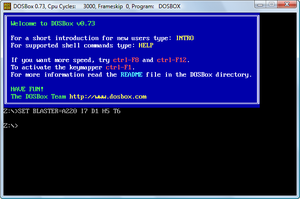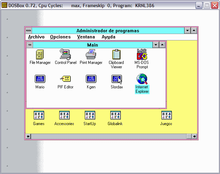- DOSBox
-
DOSBox 

DOSBox 0.73 running on Windows VistaOriginal author(s) Peter Veenstra Developer(s) DOSBox Team Initial release 22 July 2002[1] Stable release 0.74 / 12 May 2010 Written in C, C++ Operating system Cross-platform Type Emulator License GNU General Public License Website www.dosbox.com DOSBox is emulator software that emulates an IBM PC compatible computer running MS-DOS. It is intended especially for use with old PC games. DOSBox is free software.
DOSBox can be used to run old MS-DOS software, especially games, that would otherwise not work on modern computers.
Contents
Features
DOSBox is a command-line program, configured either by a set of command-line arguments or by editing a plain text configuration file. For ease of use, several graphical front-ends have been developed by the user community.[2]
DOSBox is a full CPU emulator, capable of running DOS programs that require the CPU to be in either real mode or protected mode.[3] Other similar programs, such as dosemu or VDMs for Windows and OS/2, provide compatibility layers and rely on virtualization capabilities of the 386 family processors. Since DOSBox can emulate its CPU by interpretation, it's independent of its host CPU.[3] However, on systems which provide the i386 instruction set, the option to use dynamic instruction translation is available in DOSBox. Though this setting is less accurate and reliable, it is faster than interpretive CPU emulation.
It is capable of emulating many types of graphics and sound hardware. Graphics emulation includes text mode, Hercules, CGA (including composite and 160x100x16 tweaked modes), Tandy, EGA, VGA (including Mode X and other tweaks), VESA, and full S3 Trio 64 emulation.[3] Sound hardware that can be emulated includes the PC speaker, AdLib, Gravis Ultrasound, Tandy, Creative Music System/GameBlaster, Sound Blaster 1.x/2.0/Pro/16, MPU-401, and Disney Sound Source. (MT-32/CM-32L emulation is included in unofficial builds, but not in the official source code repository due to need for copyrighted ROM images.) Storage is handled by mapping (either through the configuration file or through a command within the emulator) a drive letter in the emulator to a directory, image file or CDROM drive on the host. A permanently mapped Z: drives stores dosbox commands and startup scripts.
A popular feature of DOSBox is its ability to capture screenshots and record gameplay footage. The video is compressed using the Zip Motion Block Video codec.[4] In its uncompressed state the footage is almost an exact replica of the actual program. The video recording feature was added in version 0.65. In earlier versions, one had to rely on custom modifications and a third-party screen recorder to record video, but the quality and emulator performance was generally very poor.[5]
A component that differentiates DOSBox from other emulators is its ability to simulate peer-to-peer or Internet/Intranet networking. This includes modem simulation over TCP/IP, allowing for DOS modem games to be played over modern LANs or the Internet, and IPX network tunneling, which allows for old IPX DOS multiplayer games to be played as UDP/IP over modern LANs or the Internet. Win32 and Linux specific builds support direct serial port access. Certain third-party patches also allow DOSBox to emulate an NE2000-class network interface card as a passthrough to the host computer's own network card, essentially allowing full internet connectivity (for example, using Windows 3.1 and Trumpet Winsock) and web browsing using programs such as Netscape Navigator, albeit with little real world utility other than as a curiosity.
DOSBox contains its own internal DOS-like shell, rather than being a fully virtual PC emulator like Bochs. This means that it can be used without owning a license to any real DOS operating system. Most commands that are typically used in installer batch files are supported, but many of the more advanced commands of later MS-DOS versions (e.g. post-Windows 98 DOS shells) are not. In addition to its internal shell, it also supports running image files of games and software originally intended to start without any operating system.
DOSBox is capable of timing-compatible implementation of the serial ports, and can run older hardware and software dependent on such; however, some USB devices that are supported by the host OS can act as a replacement for older serial port devices when using the emulator.
It can also be used to install Windows 3.1, and can boot disk images with copies of other operating systems, including CP/M-86 and Windows 95, as well as real DOS environments (MS-DOS, PC DOS, DR-DOS, FreeDOS, etc.). However, the project has a policy of not adding features that aren't used by DOS games if they impact performance.
Emulation of Voodoo cards is in development. This should give not only support for games that use the Glide API, but also provide Direct3D support to Win9x guests.
Ports
DOSBox uses the SDL library and has been ported to many operating systems including Microsoft Windows, Mac OS X v10.3 or later (for example, Boxer), Linux, KolibriOS, and eComStation. Using the HX DOS Extender, it can even run in DOS.[6] The source code has also been forked to provide compatibility on a number of non-x86 PC computer platforms, including the Palm OS, PlayStation Portable, Android, Symbian, Maemo, Wii, and the GP2X, on various computing architectures including PowerPC, SPARC, MIPS and ARM. DOSBox is included in the software repositories for many Linux distributions such as Fedora, Debian, and Ubuntu. It has even been ported to Google Native Client to run old games in a web browser.
DOSBox and the Wine compatibility layer
The developers of the Wine compatibility layer (a program which allows users to run some Windows programs in other operating systems which Wine is compatible with), have begun the process of integrating DOSBox to facilitate running DOS programs which are not supported natively by the Wine Virtual DOS machine (winevdm).[7]
Unofficial builds
There are several unofficial DOSBox builds providing additional functionality compared to official release:
- ykhwong's build: Glide, MT-32, Save/Load states, etc. This build updates not only with stable DOSBox releases, but with intermediate SVN builds[8] too.
- gulikoza's build: Glide, etc.
Commercial deployment
id Software has used DOSBox to re-release vintage games such as Wolfenstein 3D and Commander Keen on Valve's Steam. In the process, it was reported they violated the program's license, the GNU GPL; the issue, which was reported as an oversight, was promptly resolved.[9][10] Activision Blizzard has also used it to re-release Sierra Entertainment's DOS games. LucasArts used it to re-release Star Wars: Dark Forces for modern machines on Steam. 2K Games producer Jason Bergman stated the company used DOSBox for Steam re-releases of certain parts of the X-Com series.[11] GOG.com uses DOSBox for all of their DOS releases.[12] Bethesda Softworks recommends DOSBox and provides a link to the DOSBox website on the downloads page for The Elder Scrolls: Arena and The Elder Scrolls II: Daggerfall.[13] [14] 3D Realms also recommends DOSBox and like Bethesda Softworks, provides a link to the DOSBox website on their downloads page.[15]
See also
- Comparison of platform virtual machines
- List of MS-DOS games
- Legacy mode
- Virtual DOS machine
- DOSEMU
- Wine
- ScummVM, a portable interpreter for classical adventure game scripting languages
- FreeDOS
References
- ^ "Project of the Month, May 2009". SourceForge. https://sourceforge.net/community/potm-200905/. Retrieved 2009-09-29.
- ^ "DOSBox Frontends". DOSBox. 2008-12-15. http://www.dosbox.com/wiki/DOSBoxFrontends. Retrieved 2009-01-03.
- ^ a b c Qbix (2008-04-30). Interview with Qbix. Interview with Classic Dos Games. http://www.classicdosgames.com/interviews/peterveenstra.html. Retrieved 2009-01-03.
- ^ "DosBox Capture Codec". 2008-03-09. http://wiki.multimedia.cx/index.php?title=DosBox_Capture_Codec. Retrieved 2009-01-03.
- ^ bakkelun (2008-03-07). "Recording video from DosBox". http://www.surg3.com/dfl/news_detail.php?id=42. Retrieved 2009-01-03.
- ^ japheth. "HX DOS Extender". http://www.japheth.de/HX.html. Retrieved 2009-01-02.
- ^ "Wine 1.3.12 Brings Initial DOSBox Integration". 2011-1-21. http://www.phoronix.com/scan.php?page=news_item&px=OTAzMw. Retrieved 2011-8-26.
- ^ SVN builds can be gotten at emucr.com
- ^ "Are id Software and Valve Thieves?". Softpedia. 2007-08-06. http://news.softpedia.com/news/Are-id-Software-and-Valve-Thiefs-62007.shtml. Retrieved 2009-01-03.
- ^ Purchese, Rob (2007-08-07). "id sorts GPL Steam issue". Eurogamer. http://www.eurogamer.net/article.php?article_id=80945. Retrieved 2009-01-03.
- ^ Bergman, Jason (2008-09-04). "Comments-morning discussion". Shacknews. http://www.shacknews.com/laryn.x?id=17846108#itemanchor_17846108. Retrieved 2009-01-03.
- ^ "Our Thanks". GOG.com. http://www.gog.com/en/thanks/. Retrieved 2009-01-03.
- ^ "The Elder Scrolls Official Site". http://www.elderscrolls.com/arena/. Retrieved 2011-03-03.
- ^ "The Elder Scrolls Official Site". http://www.elderscrolls.com/daggerfall/. Retrieved 2011-03-03.
- ^ "3D Realms Site: Master Download Page". 3D Realms. http://www.3drealms.com/downloads.html#misc. Retrieved 2009-11-05.
External links
- Official DOSBox website
- Official DOSBox forum
- Interview with Qbix, a developer of DOSBox. A technical insight into DOSBox.
Categories:- 2002 software
- DOS on IBM PC compatibles
- DOS emulators
- Free emulation software
- GP2X emulation software
- Linux emulation software
- Windows emulation software
- X86 emulators
- SDL programs
- Free cross-platform software
- Free software programmed in C
- Free software programmed in C++
- Portable software
Wikimedia Foundation. 2010.

